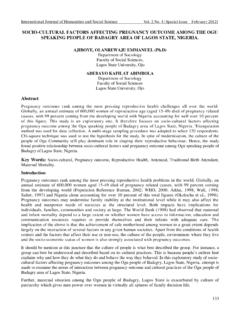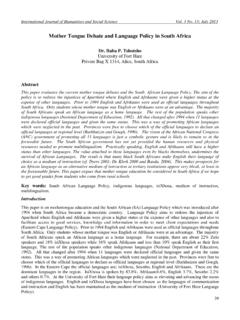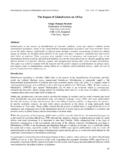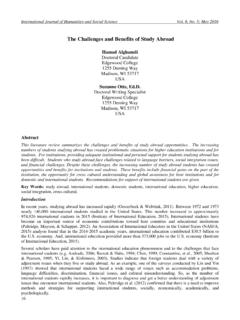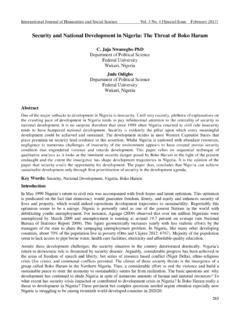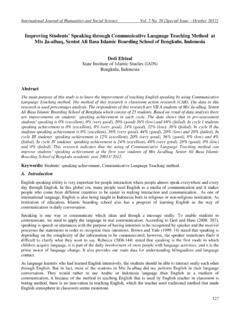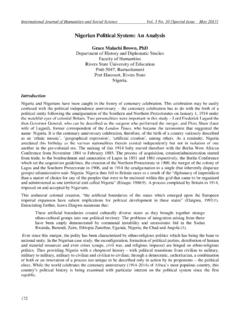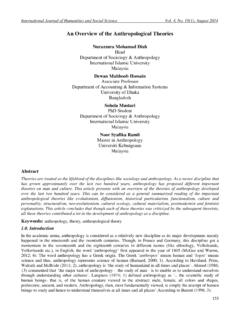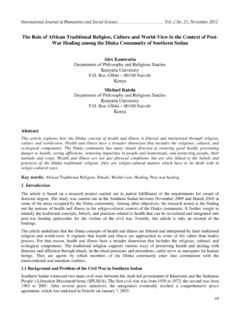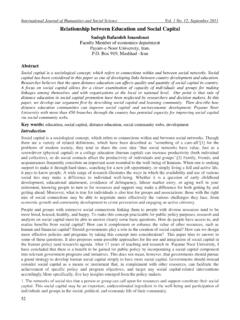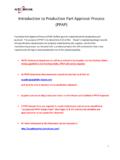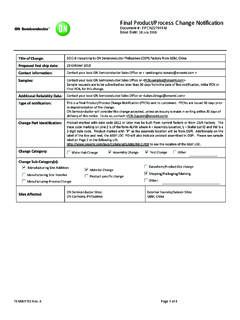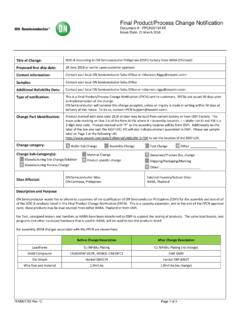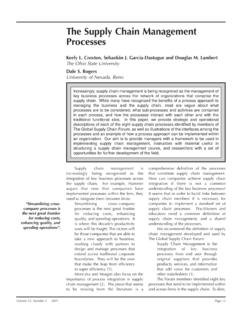Transcription of Factors Affecting the Selection of Optimal Suppliers in ...
1 International Journal of Humanities and Social Science Vol. 2 No. 14 [Special Issue - July 2012] 189 Factors Affecting the Selection of Optimal Suppliers in procurement management Ruth Mwikali The Mombasa Polytechnic University College Po Box 1135-80100, Mombasa, Kenya. Stanley Kavale, PhD Student Jomo Kenyatta University of Agriculture and Technology Mombasa CBD Campus. Mombasa, Kenya Po Box 1135-80100, Mombasa, Kenya. & Lecturer Department of Development Studies School of Human Resource Development Moi University. Eldoret - Kenya. Abstract This is a desk top study on Factors Affecting the Selection of Optimal Suppliers . The main objective was to identify the Factors Affecting supplier Selection ; the supplier Selection process has also been identified. Factors Affecting Selection of Suppliers were identified as; cost, technical capability, quality assessment, organizational profile, service levels, supplier profile and risk Factors , in that relative order.
2 This paper concludes that a cost criterion is a key factor Affecting supplier Selection for it dictates among many elements, the profit margins. Technical capability, quality of materials and the profile of the supplier are also closely considered. From the findings, we recommend that supplier Selection should be an open and transparent process, carried out by experts from all key departments and should be done in time to avoid stock outs. Key words: Optimal supplier , Selection , Factors , Introduction Background of the Study The role of purchasing in supply management has received and continues to receive increasing attention as the years go by. Purchasing enhances efficiency and competitiveness among other benefits but to realize these benefits it is imperative to select and maintain competent Suppliers .
3 However, many Factors affect a firm s ability to choose the right supplier . There is a need to understanding of the supplier Selection criteria. Some of the Factors firms consider include trust and commitment, adequate finance, quality, reliable delivery times, adequate logistic technological capabilities (Cox, 1999). Materials delivery, quality, cost/price, financial position, communication and technology is recognized as the commonly used criteria a fact confirmed from empirical results as well as in previous literature. However other criteria such as ISO certification, reliability, credibility, good references and product development were are also necessary. This shows that focus is shifting from solely relying on quantitative Factors to include qualitative criteria (Harps, 2000).
4 Many authors agree that the following Factors makes the supplier Selection decision making process complicated (Vera and Pullman, 1998). These Factors are (1) multiple criteria: Both qualitative and quantitive (2) Conflict amongst criteria: Conflicting objectives of the criteria (3) involvement of many alternatives: Because of high competition (4) internal and external constrains imposed on Buying process. However, it takes a lot of work effort and patience to develop this partnership. Since, the right supplier Selection process encompasses different functions such as purchasing, quality etc. within the company; it is a multi-objectives problem, encompassing many tangible and intangible Factors in a hierarchical manner. Effective supplier means Suppliers who can supply the right amount of materials or services at the right time, at right price and the right quality.
5 The Special Issue on Social Science Research Centre for Promoting Ideas, USA 190 It is obvious therefore, that effective supplier Selection must deal with a host of quantitative and qualitative Factors that may be in conflict with one another (Vera and Pullman, 1998). supplier Selection Process Over the last two decades the world economy has been dramatically changed due to various reasons. The environment of business is characterized by rising complexity, uncertainty, instability and volatility. Companies have to do re-thinking that traditional methods and strategies for doing business to the pressure of changing market conditions, intensified global competition, radical change in technology and shorter product life cycle.
6 Managers are now realizing that no matter how strong and resourceful their firms might be, they are no longer able to maintain a competitive advantage at every step in the value chain in all national market, nor are they able to maintain a cutting edge in the wide range of technologies required for the design, development manufacturing and marketing of new products (Hanfield and Nicholas, 2007). supplier Selection is generally considered as five phase process starting from the realization of the need for a new supplier , determination and formulation of decision criteria; pre-qualification; final supplier Selection ; to the monitoring of the supplier Selection (Choy and Lee, 2002). At first, evaluation and assessment task needs the identification of decision characteristics against which the potential Suppliers are to be assessed.
7 Next evaluation seals are selected in order to measure the appropriateness of a supplier . The next step is to assign weight to attributes to identify the significance and contribution of each criterion to the supplier evaluation and assessment. Then an attribute may comprise of several sub attributes. The last stage is to evaluate potential Suppliers against the characteristics identified at the beginning (Choy and Lee, 2002). Objectives of the Study The main objective of the study was to establish the Factors Affecting the Selection of Optimal Suppliers in procurement management . The supplier Selection process was also identified. Factors Afecting the Selection of Optimal Suppliers Li (2006) developed three Factors in supplier Selection measure based on extensive literature review and practitioner interviews.
8 He illustrated that underlying the documented Suppliers Selection criteria is the need to assess a supplier s quality and service capabilities as well as his strategies and managerial alignment with the buyer. Tan et al (1998) proposed an integrated model by combining the analytical hierarchy process and grey relation analysis in a single evaluation model. They proposed that through this model, it is possible to effectively integrate the specialized knowledge and experience of each disposed evaluation and the quantitative data to select the best supplier for cooperation. supplier Selection is usually a time consuming process that evaluates Suppliers on several criteria such as cost of production, raw material cost, quality assessment, organizational goal, quality staff, delivery system, personal facilities etc.
9 Selection of Suppliers is complicated process by the fact that numerous criteria must be considered in the decision making process. Therefore, different criteria are usually considered during the supplier Selection process. Stanley and Wisner (2001) surveyed a number of industries and suggested that quality and on-time delivery are the most important attributes of purchasing performance evaluation. Wang and Che (2007) suggested that apart from optimum cost, joint development, culture, forward engineering, trust, supply chain management , quality and communication were also important. He further suggested that the Suppliers history of supply, production price, technical capability and transportation cost also play important role during Suppliers Selection .
10 O Brian and Ghodsypour (1998), agreed that cost, quality and service that are the most important Factors in supplier Selection process. Therefore, it is important to note that cost and quality dominated more in the supplier Selection process. In the supplier Selection process, a data bank containing an authorized list of Suppliers with their profiles is crucial. Important information should include technical capability, quality assessment and organizational profile. Suppliers data regarding this criteria should be stored in a case structure consisting of a number of fields representing the criteria in each with the relevant numerical performance values of the corresponding criteria of Suppliers . Choy and Lee (2002), suggest a Case Based supplier management Tool (CBSMT) using the Case Based Reasoning (CBR) in the area of intelligent supplier s Selection and management .
